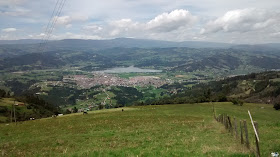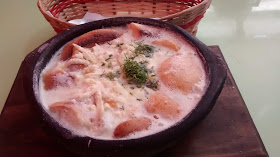Since we first came to know a few years back of the various Irishmen who played significant roles in modern Colombia's history, the town of Paipa came into our sights.
That's because the main park/square of the somewhat popular tourist spot is named after Dublin-born James Rooke — well they've Hispanicised the name to Jaime Rook, but we won't castigate them for that. The park is also home to a bust in his honour, in need of a power wash and lick of paint as it is.
How Irish he felt is open to debate. As the story goes, when he lost his arm in battle he shouted, "Viva la patria" ("Live the homeland"). When asked if that was Ireland or England, he is alleged to have responded, "The country that will bury me." Now, as far as we are aware, although we've been unable to get it confirmed, he's buried in Colombia.
That aside, considering Paipa is less than a three-hour drive from the north of Bogotá, it falls inside our 'short escape from the madness of the metropolis' category.
It's not quite the 'pueblito' we were expecting — it's a decent enough sized town. Yet, it's still far more chilled-out than midweek Bogotá (OK, that's not too hard to achieve, in fairness).
For those, like ourselves, who like to do their own thing, a stroll around the lake, with a 1.6-kilometre surface area, is a nice way to take it in and get some light exercise in the process.
If you're up for something a little more taxing, great views of the town, lake and surrounding countryside can be got by trekking up the hills to the north, behind the church on the main square.
Kayaking and other activities on the lake are also an option, but for our short stay on a tight budget, we gave them a miss.
Hot springs are another popular attraction that we left out — we've experienced our fair share of them.
In this regard, the cazuela Paipana is worth a try to kick-start your day. It's basically a super-charged changua, packed with almojábanas (a rather delicious-when-just-baked type of cheesy bread made from corn flour, another favourite in these parts) and decent offerings of quality cheese.
Speaking to some other Colombians, Paipa has a bit of a reputation for being costly in terms of accommodation. For sure, there are a number of relatively expensive, 'fancy' hotels overlooking the lake, but budget lodgings can be found as well.
The respectable Canada Hotel has single rooms from 20.000 pesos per night. It's not gold standard, but it more than adequately does the job.*
All told, and not that we're making any connection with James Rooke, but if Paipa was to be our last Bogotá escape before we potentially have to leave the country (very much alive, though, we hope), it's not a bad one to go out on.
*Canada Hotel is on Carrera 20 #23-61, just a few blocks away from Parque Jaime Rook. The friendly owner Adelaida can be contacted on +573138314483.
That's because the main park/square of the somewhat popular tourist spot is named after Dublin-born James Rooke — well they've Hispanicised the name to Jaime Rook, but we won't castigate them for that. The park is also home to a bust in his honour, in need of a power wash and lick of paint as it is.
 |
| The bust of James Rooke, aka Jaime Rook; we think! |
Irish, English or Colombian?
Coronel Rooke fought and died here in the wars of independence against the Spanish.How Irish he felt is open to debate. As the story goes, when he lost his arm in battle he shouted, "Viva la patria" ("Live the homeland"). When asked if that was Ireland or England, he is alleged to have responded, "The country that will bury me." Now, as far as we are aware, although we've been unable to get it confirmed, he's buried in Colombia.
That aside, considering Paipa is less than a three-hour drive from the north of Bogotá, it falls inside our 'short escape from the madness of the metropolis' category.
It's not quite the 'pueblito' we were expecting — it's a decent enough sized town. Yet, it's still far more chilled-out than midweek Bogotá (OK, that's not too hard to achieve, in fairness).
Lake placid
Like other lake-side towns we've visited through the years — Queenstown in New Zealand and Chile's Pucón spring to mind — it seems to have a very pleasant vibe to it. The man-made Lake Sochagota's tranquillity appears to exert a calming influence on the locals. (It might be slightly different at the weekend when more visitors are about, but the locals say it doesn't change that much.) |
| Paipa from a high. |
If you're up for something a little more taxing, great views of the town, lake and surrounding countryside can be got by trekking up the hills to the north, behind the church on the main square.
Kayaking and other activities on the lake are also an option, but for our short stay on a tight budget, we gave them a miss.
Hot springs are another popular attraction that we left out — we've experienced our fair share of them.
Cheesy cazuela
From a culinary perspective, Paipa is known for its dairy-related products, particularly cheese.In this regard, the cazuela Paipana is worth a try to kick-start your day. It's basically a super-charged changua, packed with almojábanas (a rather delicious-when-just-baked type of cheesy bread made from corn flour, another favourite in these parts) and decent offerings of quality cheese.
 |
| Hearty & wholesome-ish! Cazuela Paipana. |
The respectable Canada Hotel has single rooms from 20.000 pesos per night. It's not gold standard, but it more than adequately does the job.*
All told, and not that we're making any connection with James Rooke, but if Paipa was to be our last Bogotá escape before we potentially have to leave the country (very much alive, though, we hope), it's not a bad one to go out on.
*Canada Hotel is on Carrera 20 #23-61, just a few blocks away from Parque Jaime Rook. The friendly owner Adelaida can be contacted on +573138314483.
___________________________________________
Facebook: Wrong Way Corrigan - The Blog & IQuiz "The Bogotá Pub Quiz".

